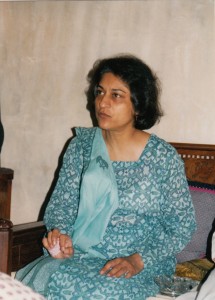AG:What can be done about human rights?
Asma Jahangir:“A lack of institutions, and an institutional response.

At some point you have to depend on state institutions for relief. You can take a movement that far but not beyond; beyond that is a wall if you’re not getting discussion in parliament; if you’re not getting relief from the courts. That is one. The second is a mind-set. And that I have no doubt cannot change that quickly. And that mind-set when you change it, you have to then marginalise more reactionary forces. There are [such reactionary forces] in every society, whether in Scandinavia or Germany or Australia.
But by bringing in a politics of tolerance in government and outside of government, in institutions, you marginalise those sections. And this is what the West does. It’s not that the West does not have prejudices or that it does not have biases, or that they don’t want to kill a black person or a Muslim or whatever. But the people [who think like that] are marginalised. Nobody will get up – no political leader – and say, let’s just get these Muslims. They may even think that, but they just can’t say it. But here you have outright demands for things like that, because it is accepted, it is welcomed and nobody will speak against it.”
AG:“Do you see any possibility of a Taliban-type movement spreading to Pakistan?”
Asma Jahangir:“Well I think that if the Taliban win we are in trouble; if the Taliban lose we are in trouble. If they win and they are in control of Afghanistan, our policies will have to be influenced because we are trying to get to the Central Asian republics and we will have to have that interaction with the government [in Afghanistan]. Plus the fact that the Taliban are Pakhtoons and they are sitting in the North West Frontier Province. Already you can see the influence in the North West Frontier Province and Peshawar. And we have a porous border with them. Their interest is to keep it porous. So you will have that influce. If they lose the war – a large number of the Taliban come from Pakistan as you’ve seen in the people who have died [in the recent American bombings of Bin Laden’s camp in Afghanistan]. Now they will obviously come back and they will bring back the comrades who have fought with them .These are going to be unemployed, desperate people [with] an agenda [of their own]. How are they going to amalgamate in this society? It is difficult for me to see. When you begin to convince yourself that you’re doing this for your religion and for God, it becomes even more dangerous, because then you are a desperado. Will the government of Pakistan be able to contain these people? The government of Pakistan will be very dependant on the army, which is the only organised force that cd contain the Taliban. [The Taliban] are very well armed and trained. [They have] ideology on their minds and [they are] used to power. No jobs, no future. Now when a government in Pakistan starts depending so heavily on the army, they are not overpowering the army, the army will overpower politics. I don’t know how long it wd be before the army started having friction [within itself] about how they would like to deal with the Taliban. This is something I cannot predict. This is a problem that shd be discussed now by our political leadership. The sad part is that our political leadership addresses a problem after it has happened.”
